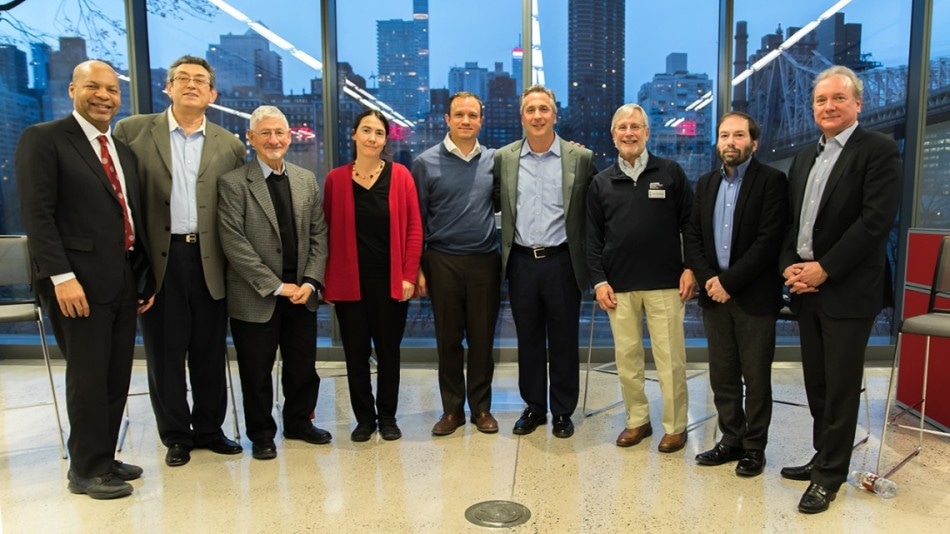Dec 11 2018
A flood of digital data, integrated with advanced algorithms to examine it, indicates a technological revolution as significant as the emergence of the internet, said panelists at the start of the Cornell-r4 Applied AI Initiative, held on December 6th at Cornell Tech.
 (Credit: http://www.cornell.edu/)
(Credit: http://www.cornell.edu/)
“The world has really undergone a seismic shift,” said Greg Morrisett, dean of Computing and Information Science (CIS) and co-chair of the new initiative, which intends to enable students, scientists, and business leaders to solve real-world difficulties with AI-powered tools. “The dramatic rise of AI and in particular machine learning has made it possible to extract information from data and perform clustering and classification, make predictions, do all sorts of things in ways that are just stunningly effective.”
The initiative, a collaboration between CIS, the College of Arts and Sciences, Cornell Engineering and the artificial intelligence company r4 Technologies, will support curriculum modifications and form industry partnerships to attack some of society’s most persistent problems. Besides new classes, master’s students will work with business leaders on relevant research projects. The initiative’s primary focus will be on the food sector, seeking to enhance the food chain to better align with demand, which would boost profitability and decrease waste.
“We are building a worldwide coalition of practitioners and doers in applied AI who are going to come together around our new center of gravity,” said co-chair Paul Breitenbach ’92, MBA ’95, founder and CEO of r4. “Bringing together these new amazing technologies to solve these practical problems is exactly what the world needs right now.”
Experts from r4 and Cornell took part in the panel, which concentrated on the future of AI in education and business and was moderated by Morrisett. Panelist Rachel Bean, senior associate dean and professor of astronomy in the College of Arts and Sciences, said a changing curriculum will better prepare Cornell students for a data-driven future and offer them a wider, more integrated education.
“These new courses that we’re developing are allowing students to incorporate data analytics, data skills, data literacy in their curriculum, and give them the opportunity to contribute in a real way to real-life problems,” said Bean, a cosmologist who has witnessed her own research change because of the massive amounts of data currently available about multiple galaxies.
We can use large-scale analyses of data not just to answer industrial questions but to really have a much richer perspective on the world.
Rachel Bean, Cosmologist and Senior Associate Dean and Professor of Astronomy, College of Arts and Sciences, Cornell University.
New classes for all students could concentrate on such themes as the philosophy of technology and the meaning of consciousness and intelligence; comprehending the impact of data on social justice; or large-scale analyses of historical texts. A fall 2018 pilot class, Urban Analytics, investigated how data can be used to enhance people’s lives.
“The idea was to give [students] the sense that the data is being collected by our cities and we can do all kinds of inference and understanding, and build models about how the cities are serving our populations,” said David Shmoys, the Laibe/Acheson Professor of Business Management and Leadership Studies in the School of Operations Research and Information Engineering, who taught the class. For instance, students examined whether police stations in Chicago are distributed suitably by assessing the city’s minute-by-minute crime data.
“It’s really a great new world, and they see the [computational] power that we can put in their hands very quickly,” Shmoys said.
Shmoys also explained his multiyear collaboration with the company that manages Citi Bike, a relationship that helped the bike-sharing operation become more sustainable and efficient—and supplied his own team with data and a demonstration of its influence. Such collaborations offer huge benefits, he said, but can take time and effort to develop.
If you look at the business world and the academic world, they’re really different cultures with different timelines and different objectives, and so how you get the two communities to have their incentives aligned so that they work together to a common goal is a big challenge.
David Shmoys, Laibe/Acheson Professor of Business Management and Leadership Studies, School of Operations Research and Information Engineering, Cornell University.
Lance Collins, the Joseph Silbert Dean of Engineering, spoke at the start of the event, held in Cornell Tech’s Bloomberg Center. Panelists Igor Zhuk, r4’s chief data scientist, and David Bradley, r4 executive vice president for solutions, deliberated how they help clients make decisions founded on data, instead of past experience—a method with implications spanning from law enforcement to healthcare to the global food chain.
Panelist Ron Brachman, director of the Jacobs Technion-Cornell Institute at Cornell Tech, said society is still in the most basic stages of the AI transformation—not just in the initial innings but “the pre-game warmups.”
We’ve gone in a certain direction to have incredibly powerful, realistic, useful, impactful outcomes, but if you think about where we have to go, as we swing back and think about complementing that with knowledge and … other elements in the broader picture of AI, the horizon is still quite out there.
Ron Brachman, Director, Jacobs Technion-Cornell Institute, Cornell Tech.